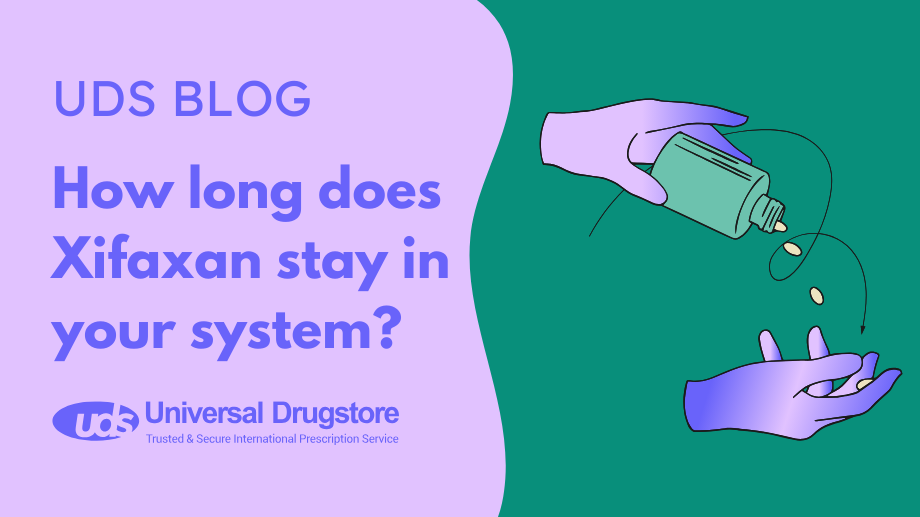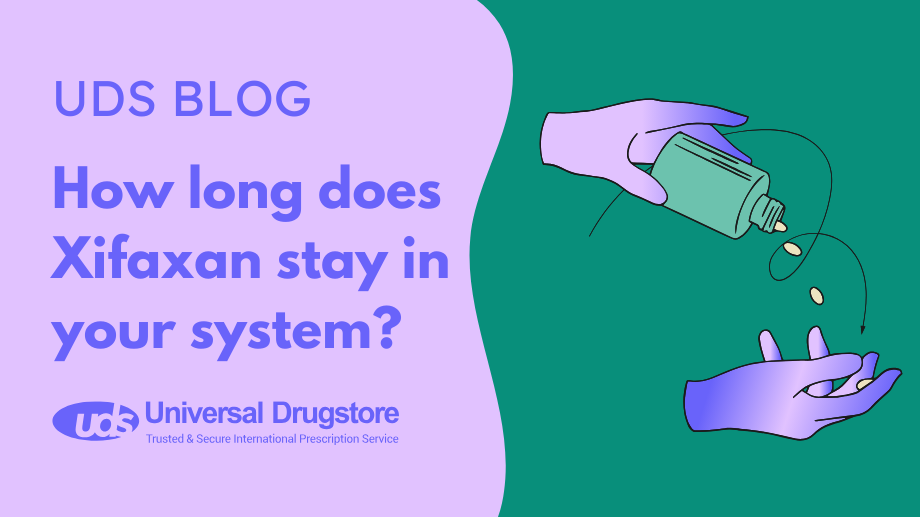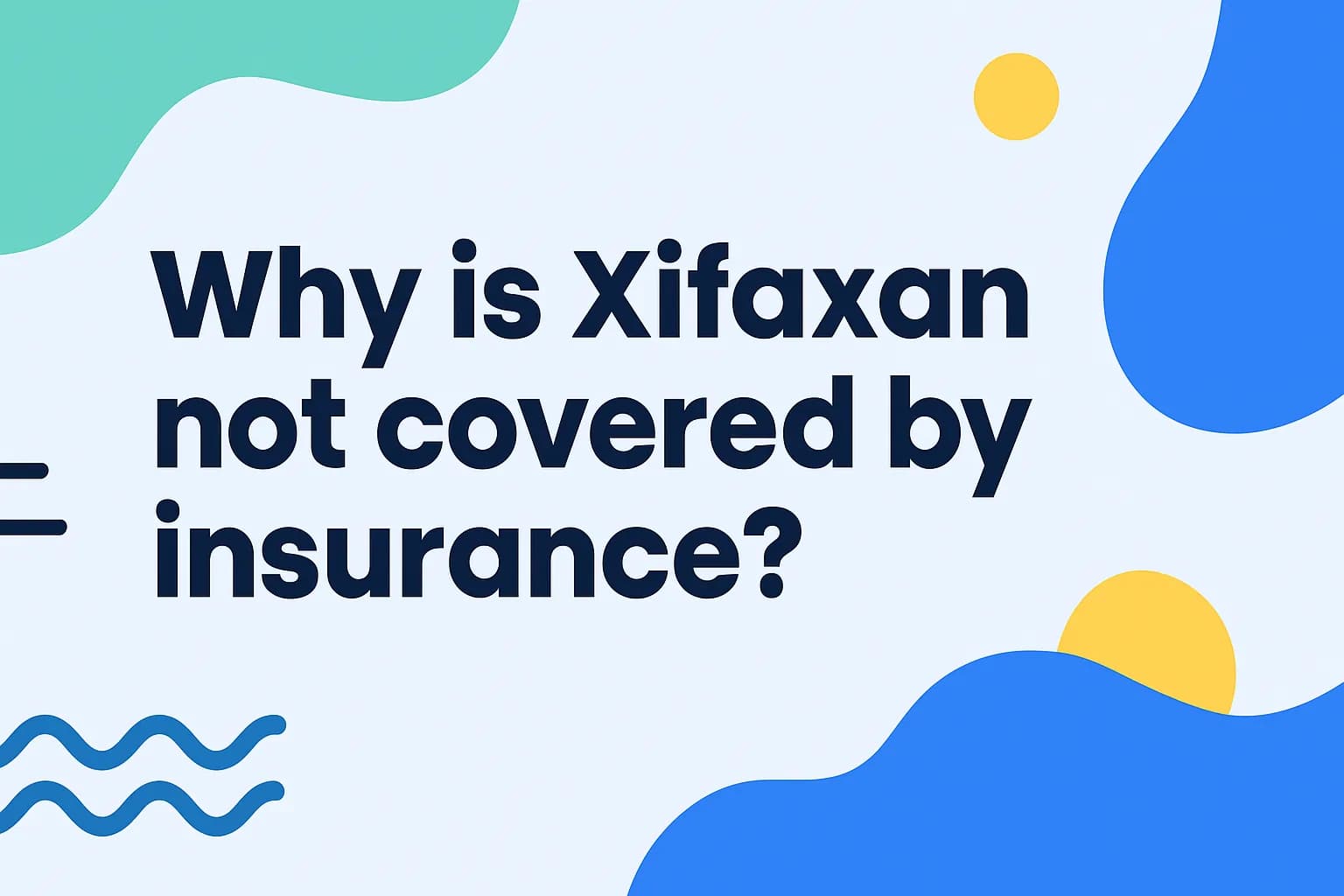How long does Xifaxan stay in your system?

The elimination half-life of a drug like Xifaxan (rifaximin) is the time it takes for half of the medication to be removed from your body. For Xifaxan, the reported elimination half-life from clinical studies is approximately 6 hours. In general, it takes about 5 half-lives for a drug to be considered eliminated from your body. Therefore, Xifaxan would typically be cleared from your system within 30 hours after the last dose. Keep in mind that this time can vary among individuals based on your metabolism and other factors.
Even though Xifaxan does not stay in your system very long, you may still experience side effects after stopping this medication. For example, Xifaxan can sometimes cause diarrhea related to a bacteria called Clostridium difficile (C. diff). This side effect can occur both during treatment and after you stop taking Xifaxan. In some cases, it can occur more than 2 months after stopping this medication. If you have any side effects that do not go away or become bothersome, contact your healthcare provider right away.
Keep reading to learn more about Xifaxan and have some frequently asked questions answered.
Xifaxan FAQs
What is Xifaxan used for?
Xifaxan is a brand-name antibiotic manufactured by Salix Pharmaceuticals. It is approved by the U.S. Food and Drug Administration (FDA) to treat:
- Travelers’ diarrhea that is caused by an overgrowth of bacteria called Escherichia coli (E. coli). Xifaxan helps treat this condition by stopping the growth of bacteria in your gastrointestinal (GI) tract.
- Overt hepatic encephalopathy (HE). This condition is a brain dysfunction that typically occurs due to severe liver disease. With HE, your liver cannot remove toxins from your blood. These toxins build up in your blood and can affect your brain, causing confusion, impaired coordination, and other changes to your mood, memory, behavior, and concentration. Xifaxan is generally used in combination with Enulose (lactulose) to treat HE.
- Irritable bowel syndrome with diarrhea (IBS-D). IBS-D typically affects your large intestine (colon) and can cause abdominal pain or discomfort and frequent bowel movements. Xifaxan is recommended by the American College of Gastroenterology for the relief of IBS-D symptoms.
While it is not FDA-approved for this condition, Xifaxan is commonly taken off-label to relieve the symptoms of a GI condition called small intestinal bacterial overgrowth (SIBO). SIBO commonly results from surgery or certain medical conditions such as Crohn’s disease, celiac disease, or diabetes that slow the passage of food and waste products in your digestive tract. This allows an overgrowth of bacteria and can lead to diarrhea, weight loss, and malnutrition.
What are the side effects of Xifaxan?
The most common side effects of Xifaxan seen in clinical trials when compared to placebo include:
- Headache
- Nausea
- Swelling in hands and feet (peripheral edema)
- Dizziness
- Tiredness
- Bloating and gas
- A build-up of fluid in your stomach (ascites)
- Increase in liver enzymes
Other possible side effects of Xifaxan include:
- Constipation
- Fever
- Muscle spasms
- Itching
- Stomach pain
- Depression
- Sore throat and runny nose
- Joint pain
- Fever
- Rash
Rarely, Xifaxan may cause serious side effects such as:
- Serious, life-threatening allergic reactions, including anaphylaxis.
Symptoms of anaphylaxis may include hives (raised red patches on your skin), skin rash, swelling of your face, lips, tongue, or throat, and shortness of breath. Seek immediate medical attention if you experience any symptoms of a serious allergic reaction.
Worsening traveler’s diarrhea
Xifaxan only works to treat travelers’ diarrhea caused by a bacteria called Escherichia coli (E. coli). But other bacterial infections can cause travelers’ diarrhea and Xifaxan will not be effective against those.
If your diarrhea symptoms get worse or persist for more than 24 to 48 hours, discontinue Xifaxan and consider alternative antibiotics.
C. difficile diarrhea
All antibiotics, including Xifaxan, can cause diarrhea from a bacteria called Clostridium difficile (C. diff). Diarrhea from C. diff is a serious infection that can lead to life-threatening colitis and it requires immediate medical attention.
Get medical help right away if you have symptoms such as increased heart rate, foul-smelling diarrhea, nausea, fever, and frequent bowel movements (even up to 15 times per day).
This side effect can occur during treatment or even months after stopping Xifaxan.
These are not all of the possible adverse events of Xifaxan. You should always seek medical advice from a healthcare professional for any questions or concerns about your medical condition or treatment. You should also read all the patient information, including your Medication Guide that comes with Xifaxan. You can report side effects to the FDA at 1-800-FDA-1088 or www.fda.gov/medwatch.
How long do side effects of Xifaxan typically last?
Xifaxan’s side effects will typically go away within a few days or weeks. However, one side effect, diarrhea from Clostridium difficile (C. diff), may occur months after you stop this medication. C. diff is a severe infection that requires immediate medical attention. Leaving this untreated can lead to serious and sometimes life-threatening complications.
Shop Medications
If you have any persistent or bothersome side effects, contact your healthcare provider immediately.
What does Xifaxan do to your body?
The active ingredient in Xifaxan is rifaximin, which is a rifamycin antibiotic. It kills bacteria in your gut by stopping them from making important proteins they need to survive.
What precautions are there with Xifaxan?
You should not take this medication if you have an allergy to rifaximin, any of the inactive ingredients in this product, or if you are allergic to medications such as Mycobutin (rifabutin), Rifadin (rifampin), or Priftin (rifapentine).
You should be sure your healthcare provider is aware of all your medical conditions as they may be contraindications or you may need increased monitoring during treatment, including:
- Liver disease. Having a severe liver problem can raise the level of Xifaxan in your blood, which could increase your risk of side effects.
- If you are pregnant or plan to become pregnant. It is not known whether Xifaxan is safe to take during pregnancy.
- If you are breastfeeding or plan to breastfeed. It is not known whether Xifaxan passes into breast milk or the effects it may have on your breastfed infant.
What drugs interact with Xifaxan?
When Xifaxan is taken with other prescription drugs, over-the-counter medications, vitamins, herbal products, and supplements, it may change how they work or increase the risk of side effects. Tell your healthcare provider about all your current medications, including:
- P-glycoprotein and/or OATP inhibitors such as cyclosporine
- Warfarin
These medications may lead to an increase in the amount of Xifaxan absorbed by your body.
Your dose of warfarin may need to be adjusted to maintain its proper blood-thinning effect if taken with Xifaxan.
This is not a complete list of drug interactions. There may be many other drugs that interact with Xifaxan.
How long does Xifaxan work for IBS?
The typical dose of Xifaxan to treat irritable bowel syndrome with diarrhea (IBS-D) is 550 mg by mouth three times daily for 2 weeks. If your symptoms come back, you may try this dose again for up to 2 more times.
Relief of IBS symptoms lasted for at least 10 weeks following treatment in about 80% of people who responded initially. Of those who required retreatment, 38% experienced significant improvement in stool consistency and stomach pain.
What happens when you stop taking Xifaxan?
Even if your symptoms have improved or gone away, you should not stop taking your medicine or lower the dosage without checking with your healthcare provider. If you stop taking Xifaxan suddenly, your condition may worsen or you may have unwanted side effects.
Does Xifaxan stay in your gut?
Yes, Xifaxan is a nonabsorbable antibiotic that acts locally in your gut to treat certain conditions. Less than 0.4% of this medication is absorbed from your GI tract. However, you will have increased exposure to Xifaxan if you have severe hepatic (liver) impairment. This may lead to an increased risk of side effects.
Can Xifaxan be used in children?
Xifaxan is FDA-approved to treat children 12 years of age and older with travelers’ diarrhea. It is not approved for hepatic encephalopathy (HE) or IBS-D in children less than 18 years old, so it is not known how safe or effective it is for them. Talk with your child’s healthcare provider about other treatment options for HE or IBS-D that may be right for your child.
Related Medications
- Immodium (loperamide)
- Bentyl (dicyclomine)
- Levsin (hyoscyamine)
- Levsin SL (hyoscyamine SL)
- Nulev (hyoscyamine)





